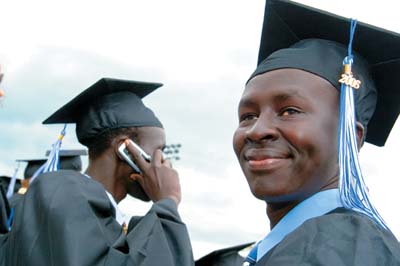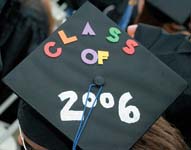 |
 |
| current issue |  |
past issues |  |
send a letter/news |  |
address update |  |
advertise |  |
about us |  |
alumni home |
Campus Currents
'A Lot Left to Do''Lost Boys' graduate, but their goals are far from accomplished
by Virginia Stuart '75, '80G
Which is more valuable, a cup of diamonds or a cup of water? Kelly Giraud posed the question to her Principles of Economics class one day.
 NEW GRADS: Mangok Bol '06, left, and Jacob "Deng" Mabil '06
NEW GRADS: Mangok Bol '06, left, and Jacob "Deng" Mabil '06
|
Two students in the class surprised the others with their perspective on the value of water. In 1987, Moses Ajou '06 and Jacob Mabil '06 walked hundreds of miles through the African desert, barefoot, without food or water. They were part of the exodus of some 20,000 people, mostly young boys, from war-shattered villages in southern Sudan. Approximately 6,000 of the refugees, who became known as the Lost Boys of Sudan, survived two desert treks by eating tree leaves and escaping attacks by lions, crocodiles and soldiers.
The Lost Boys spent 13 years in refugee camps in Ethiopia and Kenya before some 3,500 of them were invited to come to the United States, where many hoped to gain a higher education. Now they faced an epic journey of a different kind. In 2001, Mabil left a collection of mud huts, and--after attending community college in the Boston area for a year--landed in a dorm room in Hubbard Hall with a computer, a refrigerator, a microwave and a TV.
Coming from a place where access to books was rationed, the Lost Boys were used to learning by memorization. In fact, many of them, having learned English as their fourth language, prepared for the Test of English as a Foreign Language Exam by simply memorizing the entire study guide and practicing extensively, only to be flummoxed by the computers awaiting them in the examination room.

|
Giraud, an associate professor of resource economics, was instrumental in bringing five of the young men to UNH. At first, she recalls, they didn't smile much--in their tribe one didn't smile at strangers. By their second semester, the students were on the dean's list and had made many friends. Mabil and Mangok Bol '06 both became resident assistants in their dormitories. The young men preferred majors they believed would enable them to help others back in Sudan: business, economics, pre-law and pre-med.
In May, three of the five Lost Boys walked in the UNH graduation procession. "When I look back on that final day, when I see myself wearing a cap and gown, it's so amazing," says Mabil, likening the event to a second birth. He is now employed doing clerical work and looking for a job related to his degree in economics. He hopes to become an American citizen, go to graduate school and spend some time in Sudan, helping out in any way he can.
Bol, who is finishing his final courses in business administration, also hopes to help the people of his homeland someday. "Are you very happy now?" a television reporter asked him recently. Bol, who now easily flashes a gap-tooth smile on camera for an audience of thousands of strangers, pauses. "Life is good for now," he says. "But I have a lot left to do."
Giraud is proud that UNH was one of the first universities to reach out to the Lost Boys. "They have given a lot more to us than we have given to them," she says. She'll never forget that day when Mabil and Ajou helped her class understand how water could be worth more than diamonds.
Easy to print version
blog comments powered by Disqus
